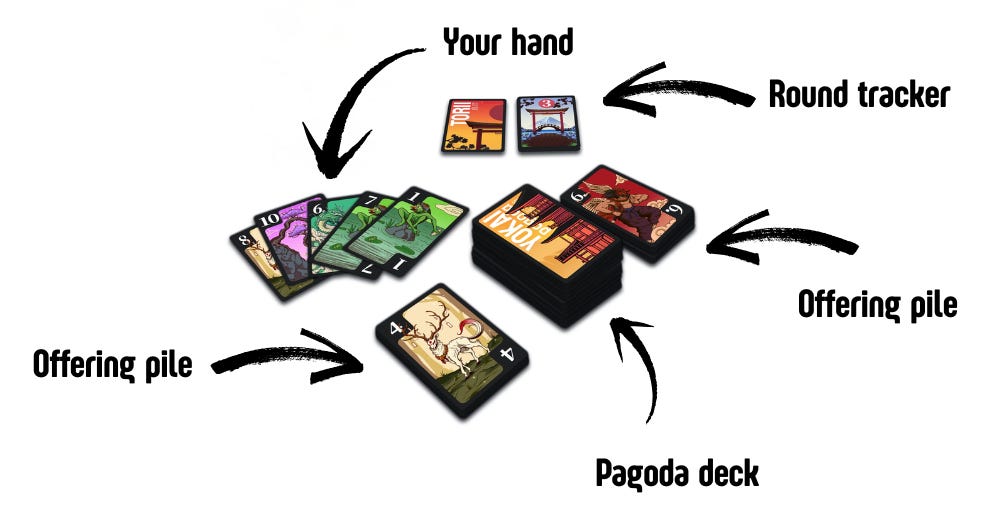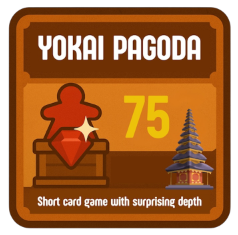Yokai Pagoda Review: The best card game I've played this year
A short, sharp 'filler' still stuck in my head
💎 BGG rated 7.7/10 w. just 498 ratings 💎
At first glance, Yokai Pagoda has “filler” written all over it. But scratch the surface and there’s far more lurking beneath…
📊 Quick stats
💡 Designer: Jacobo Rufete
🖨️ Publisher: PIF Games
📅 Released: 2023
🧑🏻🤝🧑🏿 Players: 2-5
🎂 Age: 8+
⚖️ Weight: 1.33/5
⏱️ Time: 10-15 minutes
Buy a copy:
🇺🇸 Riftgate Games (North America)
🇬🇧 Chaos Cards (UK)
🧩 Game Overview
Every culture has its meddlesome creatures.
Imps, leprechauns, fairies. Spirits that tamper with human affairs when we’re not looking.
In Japan, they’re called Yokai. Some are playful, others malevolent. If you’ve seen Spirited Away, you’ll recognise a few.
In Yokai Pagoda, you explore a haunted temple (the card deck), trying to appease ten different Yokai with careful offerings.
The deck consists of ten suits — one for each Yokai — with cards numbered 1 to 10. Each round, players receive a fresh hand of ten cards.
Playing Cards & Making Offerings
In the centre are two offering piles, one on each side of the pagoda deck. On your turn you’ll play a card onto one of these piles and trigger an effect, depending on how your card compares to the one on top.
Match suit or number? You discard on top and offload a second card from your hand into another player’s. Cue the “hot potato” of punishing cards bouncing around the table.
Can’t match?
Play a higher card. You discard it and either draw a blind card from the pagoda deck or take the top card from the opposite offering pile.
Want to play a lower card? You then calculate the total value of your hand. If it’s above 3, nothing happens. If it’s 3 or less, you can end the round immediately, or choose keep playing. End the round and you must show your hand.
How You Score
This is the sharpest part of the design. The goal is a low score, but it’s not as simple as adding up your hand. You only score the lowest card in each suit.
So a single ‘1’ in a suit cancels out that ugly ‘9’ you were stuck with. This means collecting low cards in a wide spread of suits can be key. Passing that high card to an opponent might not be as devastating as it seems.
At the end of each round you add your leftover hand to your “failed offerings”, a personal, face-down pile.
You can check your failed offerings pile at any time to track your score and plan around it.
After three rounds (four in a 2-player game), everyone reveals their failed offerings and totals the lowest card in each suit.
Lowest score wins.
🧠 G.A.M.E. Analysis
🎲 G - Gameplay
(pacing, downtime, intuitiveness)
As you’d expect from a pure card game, Yokai Pagoda is brisk. Setup is near-instant and you’re done in about 15 minutes.
The rules, however, aren’t as breezy. Each play option is highly conditional. Match suit or number and you do X, go higher and do Y. Go lower instead and if Z is true choose between A and B, else just do A. Initially it feels more like an Excel formula than a card game.
It’s not naturally intuitive. In early plays, you’ll often find yourself narrating turns aloud just to confirm you’re doing it right. If you’ve read my other reviews, you’ll know I love a good player aid. Fortunately, Yokai Pagoda includes one and it helps a lot.
After two or three games, the logic starts to click and the friction fades. That said, managing your “failed offerings” pile remains a bit fiddly. You’re constantly thumbing through it to recall what’s there.
⭐ Score: 18/25
🎨 A - Art & Theme
(visual appeal, thematic coherence, component quality)
I’m a sucker for a Japanese theme and that’s what initially drew me to the game. Unfortunately, it doesn’t do much beyond window dressing. That’s not uncommon for card games as it’s tough to nail a theme without a board or other components.
The card art is fine, though on the darker side. I just feel the artwork could sing more. The yokai illustrations are mostly hidden in-hand and the only way to distinguish suits is by background colour. No suit symbols, which isn’t ideal.
Card quality, however, is excellent. No corners cut there.
⭐ Score: 14/25
⚙️ M - Mechanics
(design elegance, balance, novelty)
If it seems like I’ve been down on the game so far, I’m about to award some big points. Yokai Pagoda is just so damn clever.
At first, it looks like a simple game. After all, there are just ten cards in each of ten suits. However, the sheer depth of the gameplay astounded me. With each new game comes another ‘Huh!” Moment when you discover a fresh layer.
Here’s just one example of how the two piles make for interesting choices. The well thought out scoring system means that people naturally want low cards to mitigate their high cards. Playing a high card to the opposite pile makes it a lot harder for them to take a low card from the other. So hanging on to high cards can be powerful, but also you risk getting stuck with them. For me, it’s these kind of tense trade-offs that make the game.
Everyone I’ve played with so far was unanimous that this is a gamer’s card game. There’s no way it’s as light as its BGG rating suggests. The rules may seem clunky at first, but they make for a beguiling game.
It has the highest strategic depth to game length ratio of any filler game I’ve played.
⭐ Score: 23/25
😄 E - Enjoyability
(fun factor, replayability, emotional response)
This isn’t a game people laugh through, but it’s enjoyable in a different, more cerebral way. It’s all about the mental dance of outmanoeuvring opponents, setting traps and blocks, and watching high cards ricochet back and forth in a tense battle of wits.
It’s short enough that most times it ends with “another game?” Replayability is strong, especially once everyone knows the system.
⭐ Score: 20/25
🔨 Final Verdict
Yokai Pagoda is the best new card game I’ve played so far this year. It’s a rare case of a fast-playing ‘filler’ that offers real strategic meat.
I’m happy with the theme, but I’d look again at the artwork and then it would really pop.
But even now it’s an elegant, under-the-radar gem that should be winning far more plaudits.
Buy a copy:
🇺🇸 Riftgate Games (North America)
🇬🇧 Chaos Cards (UK)
💬 Support Hidden Gem Board Games
Found a gem here? Help us unearth the next one.
Even a small Ko-fi donation helps us buy, play and review under-the-radar games worth your time.
📩 Got a game you'd like us to feature?
We're always on the lookout for off-the-beaten-track board and card games that aren't getting the attention they deserve.
To be considered for Hidden Gem Board Games, titles must meet two simple criteria:
⭐ An average rating of 7.0 or higher on BoardGameGeek
👥 Fewer than 1,000 total ratings
Know a great game that’s flown under the radar?
Or maybe you're a designer or publisher interested in sending a review copy in exchange for an honest write-up? (We're based in the UK.)
We’d love to hear from you:
📧 hiddengemboardgames@gmail.com
Note: We only cover board and card games — no RPGs, miniatures, or TTRPGs.
Please make sure to read our review policy before reaching out.






